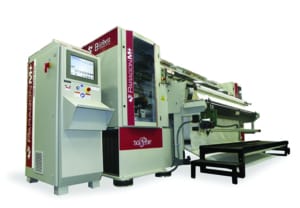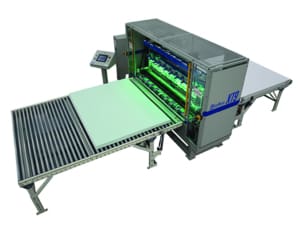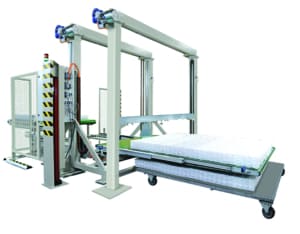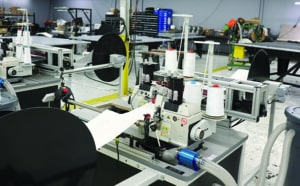Machinery specialist focuses on innovation, customer service to meet manufacturers’ production challenges
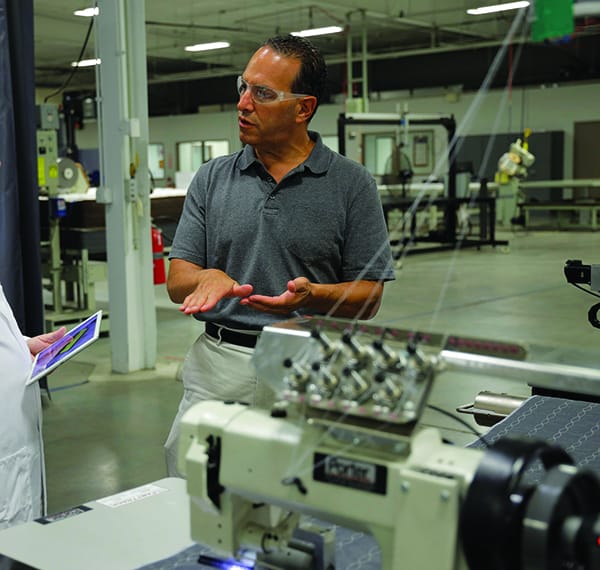
Global Systems Group produces the machinery that forms the backbone of the mattress manufacturing plant — the equipment needed to produce, assemble and package mattresses, and the automated systems that keep plants running efficiently. As the company name implies, GSG does it for bedding producers around the world.
Company executives say GSG excels at its mission thanks to decades of experience and a talented team that designs and builds innovative machinery, but, they say, it’s the softer skills, like customer service, that set the company apart from its competitors.
“The pandemic revealed how fragile and vulnerable some businesses are,” says Paul Block, president of sales for GSG, a division of industry supplier Leggett & Platt Inc., with headquarters in Carthage, Missouri. “GSG recognizes that the health of our business depends on the health of our client’s business, so we want to do all we can to empower them with all the tools we can provide to strengthen their manufacturing processes.”
GSG is focused on the long-term success of customers, while responding to their immediate needs, Block says. As part of that effort, the company is devoting “more resources than ever before” to managing customer relationships and improving communication channels.
“A lot of companies have good people, but the commitment by our staff to service the customer — to make sure they get the best of our thought processes, the best engineering, the best service of their machines, the best information we have — is very much the strength of our company,” Block says. “Customers appreciate that despite the large size of our company, we are able to maintain close personal relationships, and they acknowledge the genuine concern we have for their success.”
In it for the long run
GSG claims a venerable spot in the industry. “GSG is the most experienced manufacturing systems provider in the industry, and has designed more new methods to improve mattress products and production processes than anyone in the world,” Block says. “We’ve been an established leader in the industry longer than some competitors have been in existence.”
L&P’s Bedding Products segment, which includes bed- and spring-making machinery, had a strong 2021. Final results weren’t available when BedTimes went to print, but segment sales were up 48% in the second quarter and up 13% in the third quarter over the prior-year periods. (The segment also includes adjustable beds, steel rod and wire, foam and springs.)
GSG describes itself as a “collection of top mattress machinery brands,” including some of the oldest in the bedding industry. (See story on page 16.) The umbrella division has grown largely through L&P’s acquisitions and strategic partnerships and, during a particularly busy time in the 1990s, L&P purchased Gribetz International, Gateways Systems, Porter International and Syd-Ren. In 2010, it acquired Galkin Automated Products, a sewing machine and automation specialist founded in 1908 and purchased by Block’s father, Charles Block, in 1972.
“There are many niche operations within mattress manufacturing. So, each of our companies offers top-quality, proven equipment, and our sales team serves as a single reference point for clients that may need a variety of machinery types,” Block says. “Whether they want a single-sided bed binding machine, a faster quilter or 600 feet of automated conveyor systems, they can enjoy the convenience of dealing with the same GSG representative for all of it.”
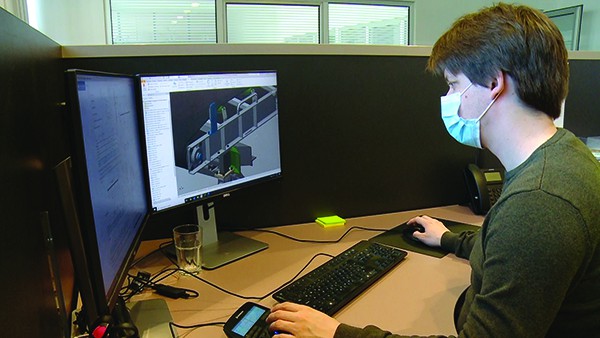
“We invented it”
About 90% of GSG’s machinery is intended for mattress production; the remainder is used for related soft goods, such as pillows.
The company holds many patents on machinery and manufacturing methods and, Block says, has been a pioneer in a long list of machinery categories, including tack-and-jump quilters, computerized chainstitch quilters, flangers and semiautomatic flangers, semiautomatic tape-edge machines, roll-pack machines and automated border systems. The list goes on. GSG, Block says, also been an innovator in creating wrappers for automated mattress packaging, BatchMode and Autoschedule interconnected computer machine technology, and pick-and-place systems for springs and components.
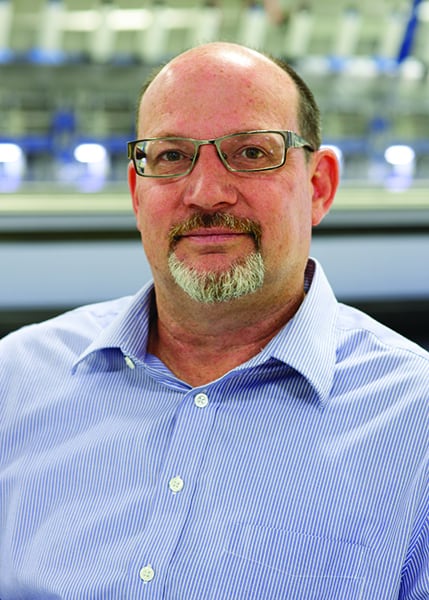
Randy Metcalf, GSG marketing manager, has been with the company since 2006.
“We have developed so many patented innovations that have become industry standards that people don’t realize it,” Block says. “Many of our popular machines don’t just replicate the process, we invented it.”
That emphasis on innovation continues, says Randy Metcalf, marketing manager for GSG, who joined the company in 2006. “When we’re developing machines, we’re not trying to match what a competitor is doing. We’re usually at the forefront of new territory. We’re always looking for the next thing, giving the industry a way to do things better.”
For instance, GSG introduced its first roll-pack machine at ISPA EXPO 2008 as a way of helping mattress makers reduce shipping and storage costs by making bulky units more compact. It was several years before the explosion in online mattress sales that have since made such equipment ubiquitous in bedding plants.
The company points to a handful of machines that represent the capabilities of its offerings:
• Paragon M+: This three-needle-bar mattress quilter is the latest iteration of a machine first introduced 20 years ago by GSG’s Gribetz International brand. GSG calls it “the most all-around robust and versatile quilter in the world.” “The Paragon combines all the best qualities in a mattress quilter to deliver top-quality products and top-speed production,” Block says.
• PS-140U automated stacker/unstacker: Using motorized belt conveyors, this labor-saving system from Gateway Systems transfers spring units, finished mattresses and other bedding units to carts or to additional transport equipment. Integrated grippers enable it to unload a stack, too. “Current labor shortages and other operational pressures on profits make it ever more crucial to eliminate non-value adding touches in the workplace,” Block says. “The PS-140U allows workers to focus their time and energy on more profitable production tasks.”
• EST-501 semiautomatic flange machine: Manual flangers require operators to maneuver heavy quilt panels. The EST-501 from Porter International uses turning belts synchronized with the flanger sewing head to move panels through the process with less effort by the operator. “The EST-501 makes the critical job of flanging mattress quilt panel edges with a sewn overlock stitch so easy that any new hire or low-skilled employee can achieve high-quality production,” Block says.
• XT9 Stitch Bridge: One of the newest from GSG, this Gribetz International machine binds multiple layers of foam sheets together with thread instead of using glue-based lamination, and does so without compressing the foam. It’s a process far more cost-effective and efficient than gluing, according to the company.
The XT9, Block says, had been “an idea on the books” at GSG for a while and originally was intended for a different purpose when, at a regular monthly meeting to assess the progress of projects, the team “decided we were going to do something completely different with it.”
Originally introduced two decades ago, the Paragon M+ is the latest iteration of the mattress quilter from GSG’s Gribetz International brand.
The XT9 Stitch Bridge from GSG’s Gribetz International brand uses thread instead of glue to bind together multiple sheets of foam without compressing them, the company says.
The PS-140U automated stacker/unstacker is a labor-saving system from GSG’s Gateway Systems brand that transfers spring units and finished mattresses. It unloads stacks, too.
GSG’s Porter International brand specializes in designing and producing sewing machine equipment at a plant in Carthage, Missouri.
But most ideas for new machines and advancements for existing equipment come from factory visits and discussions with mattress producers, Block says. The process — from initial design to prototype development to production to placement in bedding plants — can take as long as three years. GSG asks customers to give input along the way and typically tests a new machine in a manufacturer’s plant before launching it more widely.
“We spend a lot of time developing things for particular customers,” Block says. “We had an instance this morning where a customer needed something that’s a little different from what we have in our line and what’s in the marketplace. We had a meeting with their engineering team and ours to move forward to develop what they need.”
It’s not just massive pieces of sophisticated machinery that GSG makes for customers. “We make a lot of work aids, things like special tables and conveyors, that help improve safety and ergonomics or that de-skill an operation,” Block says.
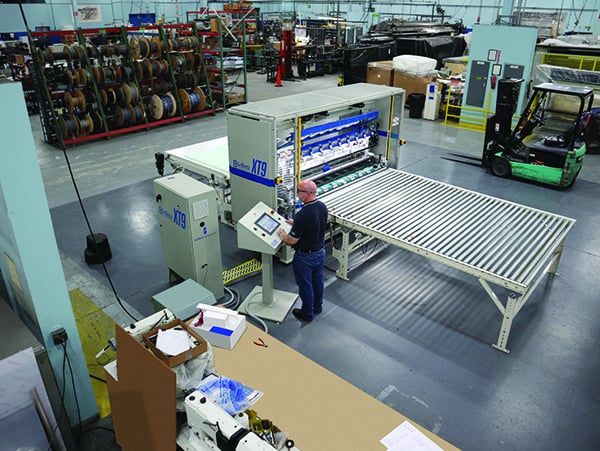
All told, the company has more than 300 items, not including machinery parts, in its catalog.
GSG is staying mum about its specific plans for the next year or two, but Block does say priorities will be creating machinery that is easy to operate and easy to maintain, that is flexible and able to perform a variety of tasks, and that is well-integrated with communication technology to improve overall operations.
And, Block says, “our focus is definitely on improving full production-line efficiency, not simply being a provider of isolated workstations. Whether the client is a large, multisite corporation or a small mattress house, we are working with the client to evaluate how the machinery we will be providing integrates into the full production process for maximized efficiencies.”
At its customers’ service
With long-standing brands and its reach around the globe, GSG must be able to service machines decades old and located around the globe.
“Almost nobody else has machines out in plants as long as we’ve had. We have thousands of machines around the world, some 30, 35, 40 years old. A customer can have a machine go down and it’s got an operating system that hasn’t been made in years. They expect us —and should expect us — to be able to service those machines. It’s a challenge our competitors don’t have, and it’s substantial,” Block says.
“Our focus is definitely on improving
full production-line efficiency.”
In addition, Block says, because GSG makes equipment for every aspect of the mattress manufacturing process, “our machines have a wider range of complexities than most competitors and perform a huge variety of mattress production tasks. It also takes a staff of extremely talented and experienced team members to handle such diverse machine types.”
GSG keeps a service record of every machine it produces, giving the company a complete history of each, which helps with troubleshooting and repairs. And the company strives to alert mattress manufacturers using those oldest machines when it foresees parts will no longer be available or when an operating system will no longer be supported by computer companies. Then it works with its customers on transition plans.
“This is an issue for everybody, but it’s compounded for us by the longevity of our machines,” Metcalf says. “It’s one thing for a computer to operate for years on a desk in an office, but these machines are essentially computers in factories, with all the dust, vibrations and stresses. To keep them alive so long is a real testament to our quality components and technicians.”
The company has sales and service centers on every continent, except Antarctica. (Not a lot of mattress manufacturing on the ice-covered continent.) “So, we have service offices that are easy to communicate with and coordinate service calls very responsively,” Block says.
To service newer machines, GSG technicians can log in and troubleshoot as if they are operating the machine in the plant. The company also offers an online system to log service tickets and an online parts catalog so customers can place orders 24/7. In-stock parts typically ship the same day.
In addition, GSG continually updates its online catalog of patterns for its Gribetz quilters, both with original designs created by its full-time designer and with customer-generated designs the company can enhance to make them most compatible for quilting to optimize machine performance.
“Gribetz machines are delivered to the client preloaded with hundreds of popular patterns, so it is easy to select a handful of these and make years’ worth of beds,” Block says. “But when they need a little extra product design creativity, this simple service can provide a great advantage for them.”
The Covid-19 pandemic, which significantly reduced business travel and canceled many in-person trade shows, prompted GSG to improve the way it communicates with customers.
“The reduction of face-to-face meetings has created more focused discussions since available meeting time and resources have become more valuable,” Block says. “We are making the most out of the limited conversations we all have. And, lacking the ability to ‘show’ GSG the problem in person, customers and GSG have honed verbal, written and remote video communication skills to be more direct and specific about the issues customers have.”
‘Doing the right thing’
Block grew up in the machinery business through Galkin and, beginning in the mid-1980s, led that company’s expansion into the bedding market, before selling the company to L&P and joining GSG in 2010.
“The company has always been well-run,” Block says of GSG. “I feel like we’re doing the right thing — resolving customers’ issues, making them better. I realize I’m not curing cancer or teaching children. I mean, we’re selling machines, but I feel like I’m doing something meaningful.”
‘Hyper-Focused’ on Improving the Production Process
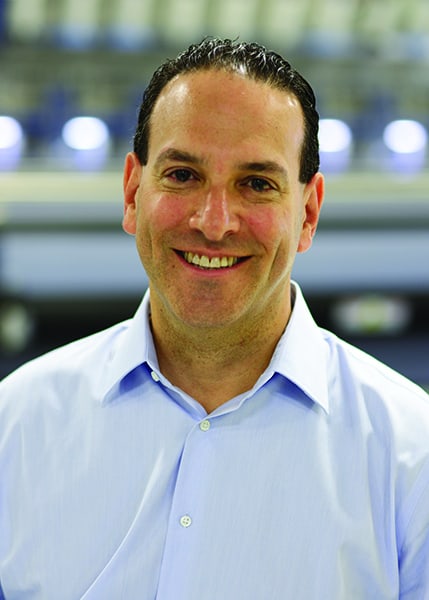
Paul Block, president of sales for Leggett & Platt Inc.’s Global Systems Group, says GSG wants to help manufacturers make plants more efficient by adding automation, but also
eliminating tasks that don’t add value.
Most machines for mattress production have a particular function, say quilting a panel, roll packing a finished mattress, or moving components from one place to the next.
Global Systems Group strives not only to help mattress producers with those specific tasks but also tries to help them meet myriad business challenges. Chief among them are a labor shortage and global supply chain disruptions. De-skilling operations, eliminating waste and improving efficiencies are not new strategies for mattress makers or for GSG, but they have taken on new urgency because of the Covid-19 pandemic.
“We are really focused on improving the entire mattress production process for customers. What appear to be isolated inefficiencies in a specific production area almost always impact downstream operations, and the current labor and materials shortages are now compounding this problem across entire factories and multilocation operations,” says Paul Block, president of sales for GSG, part of Leggett & Platt Inc. in Carthage, Missouri. “In the past, when labor and materials were plentiful, manufacturers could compensate for inefficiencies by over producing without excessive impact on the bottom line. Now, they must achieve greater daily productivity from their limited staff and eliminate waste of their less available materials. So, GSG is focusing on systems that eliminate waste (materials, labor and space) and increase overall throughput by improving the entire process, not just individual workstations.”
To address labor shortages, GSG takes an approach that makes production tasks less taxing on the body and easier to do with less instruction. This makes mattress manufacturing jobs more attractive to candidates. It also enables bedding makers to shorten training times and rotate available workers into different jobs without sacrificing product quality.
GSG has been “hyper-focused” on automation for years, Block says, noting that automation includes everything from moving assembly lines to robotic arms — anything, really, “that replaces a manual operation with a mechanized function.”
“We are not just addressing the need to add robotics,” Block says. “GSG is first evaluating production processes to create equipment that eliminates steps that don’t add value to the finished product. We have been demonstrating the value of robotics for repetitive actions for nearly 20 years. But why add robotics to perform a repetitive task if the process can be modified to limit the need for these steps altogether?”
That’s part of production management, which involves everything from reducing production interruptions to coping with shortages of components. Automation can assist there, too. “A more automated scheduling technology that keeps the workflow progressing well,” Block says, “could be just as valuable as a host of robots.”
The Many Parts of the GSG Whole
The Global Systems Group umbrella includes six brands and has strategic partnerships with five other machinery and equipment companies.
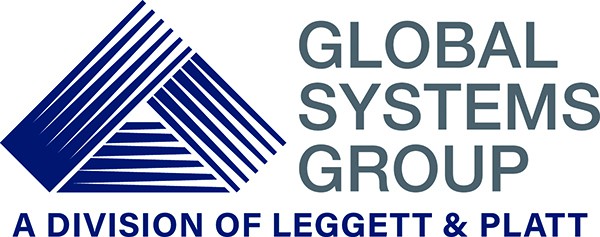
Brands under the GSG umbrella
• Galkin Automated Products
• Gateway Systems
• Gribetz International
• Porter International
• Spühl Anderson
• Syd-Ren
Strategic partnerships:
• Merello
• Nähtec
• Quarrata Forniture
• Teknomac
• Waste-Exit
“As GSG has grown, we have acquired or partnered with companies that either offer a unique, high-quality machine type (e.g., quilter, sewing system, tape-edge machine, packaging) or they are highly respected names in local markets — either to improve the products or, more importantly, to offer a better service for customers around the world,” says Paul Block, president of sales for GSG, which is owned by Carthage, Missouri-based Leggett & Platt Inc.




